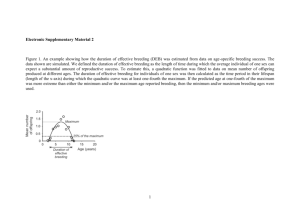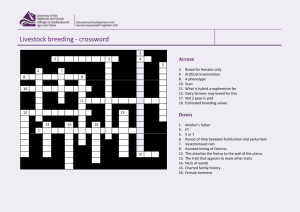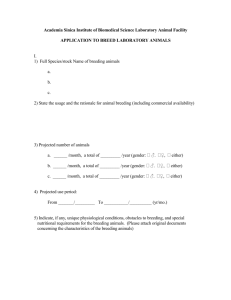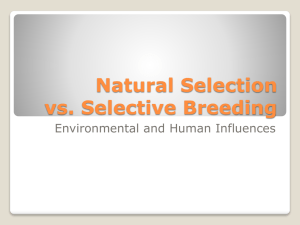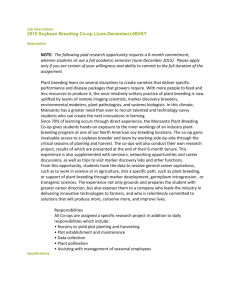Breeding Effort by Crop Releases in the past 5 years Crop PYs
advertisement
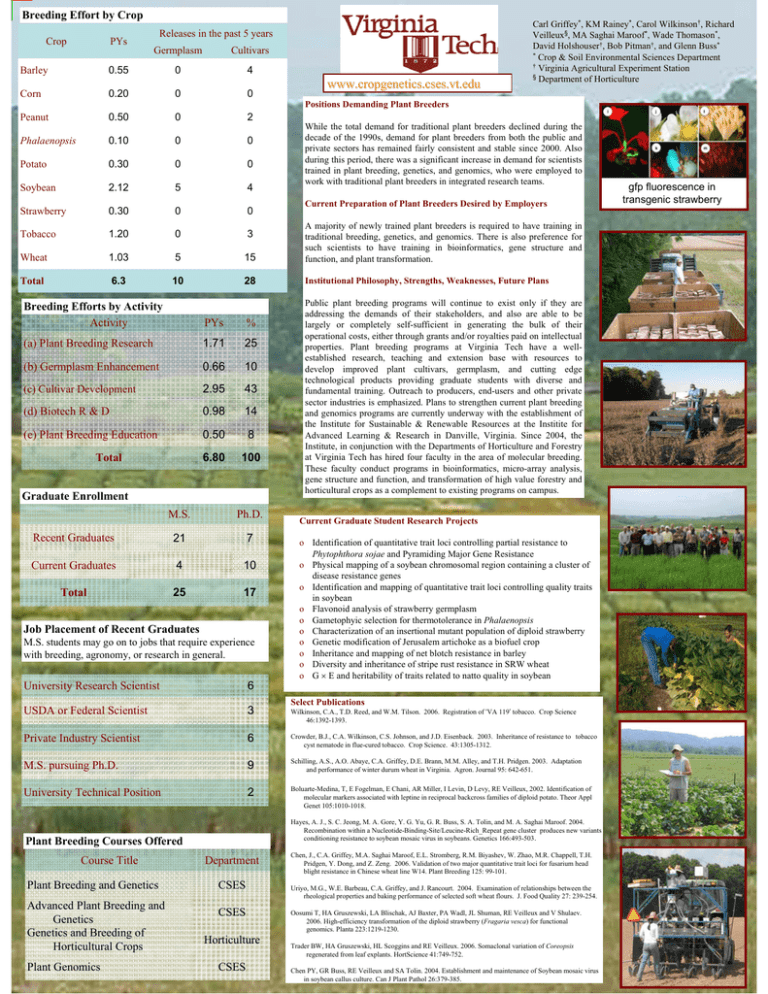
Breeding Effort by Crop Crop PYs Releases in the past 5 years Germplasm Cultivars Carl Griffey*, KM Rainey*, Carol Wilkinson†, Richard Veilleux§, MA Saghai Maroof*, Wade Thomason*, David Holshouser†, Bob Pitman†, and Glenn Buss* * Crop & Soil Environmental Sciences Department † Virginia Agricultural Experiment Station § Department of Horticulture Barley 0.55 0 4 Corn 0.20 0 0 Peanut 0.50 0 2 Phalaenopsis 0.10 0 0 Potato 0.30 0 0 Soybean 2.12 5 4 Strawberry 0.30 0 0 Tobacco 1.20 0 3 Wheat 1.03 5 15 A majority of newly trained plant breeders is required to have training in traditional breeding, genetics, and genomics. There is also preference for such scientists to have training in bioinformatics, gene structure and function, and plant transformation. Total 6.3 10 28 Institutional Philosophy, Strengths, Weaknesses, Future Plans www.cropgenetics.cses.vt.edu Positions Demanding Plant Breeders Breeding Efforts by Activity Activity PYs % (a) Plant Breeding Research 1.71 25 (b) Germplasm Enhancement 0.66 10 (c) Cultivar Development 2.95 43 (d) Biotech R & D 0.98 14 (e) Plant Breeding Education 0.50 8 6.80 100 Total Graduate Enrollment M.S. Ph.D. Recent Graduates 21 7 Current Graduates 4 10 Total 25 17 Job Placement of Recent Graduates M.S. students may go on to jobs that require experience with breeding, agronomy, or research in general. While the total demand for traditional plant breeders declined during the decade of the 1990s, demand for plant breeders from both the public and private sectors has remained fairly consistent and stable since 2000. Also during this period, there was a significant increase in demand for scientists trained in plant breeding, genetics, and genomics, who were employed to work with traditional plant breeders in integrated research teams. Current Preparation of Plant Breeders Desired by Employers Public plant breeding programs will continue to exist only if they are addressing the demands of their stakeholders, and also are able to be largely or completely self-sufficient in generating the bulk of their operational costs, either through grants and/or royalties paid on intellectual properties. Plant breeding programs at Virginia Tech have a wellestablished research, teaching and extension base with resources to develop improved plant cultivars, germplasm, and cutting edge technological products providing graduate students with diverse and fundamental training. Outreach to producers, end-users and other private sector industries is emphasized. Plans to strengthen current plant breeding and genomics programs are currently underway with the establishment of the Institute for Sustainable & Renewable Resources at the Institite for Advanced Learning & Research in Danville, Virginia. Since 2004, the Institute, in conjunction with the Departments of Horticulture and Forestry at Virginia Tech has hired four faculty in the area of molecular breeding. These faculty conduct programs in bioinformatics, micro-array analysis, gene structure and function, and transformation of high value forestry and horticultural crops as a complement to existing programs on campus. Current Graduate Student Research Projects o Identification of quantitative trait loci controlling partial resistance to Phytophthora sojae and Pyramiding Major Gene Resistance o Physical mapping of a soybean chromosomal region containing a cluster of disease resistance genes o Identification and mapping of quantitative trait loci controlling quality traits in soybean o Flavonoid analysis of strawberry germplasm o Gametophyic selection for thermotolerance in Phalaenopsis o Characterization of an insertional mutant population of diploid strawberry o Genetic modification of Jerusalem artichoke as a biofuel crop o Inheritance and mapping of net blotch resistance in barley o Diversity and inheritance of stripe rust resistance in SRW wheat o G × E and heritability of traits related to natto quality in soybean University Research Scientist 6 USDA or Federal Scientist 3 Private Industry Scientist 6 Crowder, B.J., C.A. Wilkinson, C.S. Johnson, and J.D. Eisenback. 2003. Inheritance of resistance to tobacco cyst nematode in flue-cured tobacco. Crop Science. 43:1305-1312. M.S. pursuing Ph.D. 9 Schilling, A.S., A.O. Abaye, C.A. Griffey, D.E. Brann, M.M. Alley, and T.H. Pridgen. 2003. Adaptation and performance of winter durum wheat in Virginia. Agron. Journal 95: 642-651. University Technical Position 2 Boluarte-Medina, T, E Fogelman, E Chani, AR Miller, I Levin, D Levy, RE Veilleux, 2002. Identification of molecular markers associated with leptine in reciprocal backcross families of diploid potato. Theor Appl Genet 105:1010-1018. Plant Breeding and Genetics Advanced Plant Breeding and Genetics Genetics and Breeding of Horticultural Crops Plant Genomics Wilkinson, C.A., T.D. Reed, and W.M. Tilson. 2006. Registration of ‘VA 119’ tobacco. Crop Science 46:1392-1393. Hayes, A. J., S. C. Jeong, M. A. Gore, Y. G. Yu, G. R. Buss, S. A. Tolin, and M. A. Saghai Maroof. 2004. Recombination within a Nucleotide-Binding-Site/Leucine-Rich_Repeat gene cluster produces new variants conditioning resistance to soybean mosaic virus in soybeans. Genetics 166:493-503. Plant Breeding Courses Offered Course Title Select Publications Department CSES CSES Horticulture CSES Chen, J., C.A. Griffey, M.A. Saghai Maroof, E.L. Stromberg, R.M. Biyashev, W. Zhao, M.R. Chappell, T.H. Pridgen, Y. Dong, and Z. Zeng. 2006. Validation of two major quantitative trait loci for fusarium head blight resistance in Chinese wheat line W14. Plant Breeding 125: 99-101. Uriyo, M.G., W.E. Barbeau, C.A. Griffey, and J. Rancourt. 2004. Examination of relationships between the rheological properties and baking performance of selected soft wheat flours. J. Food Quality 27: 239-254. Oosumi T, HA Gruszewski, LA Blischak, AJ Baxter, PA Wadl, JL Shuman, RE Veilleux and V Shulaev. 2006. High-efficiency transformation of the diploid strawberry (Fragaria vesca) for functional genomics. Planta 223:1219-1230. Trader BW, HA Gruszewski, HL Scoggins and RE Veilleux. 2006. Somaclonal variation of Coreopsis regenerated from leaf explants. HortScience 41:749-752. Chen PY, GR Buss, RE Veilleux and SA Tolin. 2004. Establishment and maintenance of Soybean mosaic virus in soybean callus culture. Can J Plant Pathol 26:379-385. gfp fluorescence in transgenic strawberry

